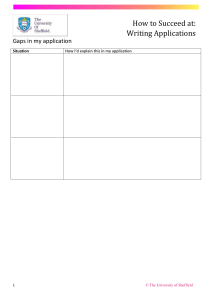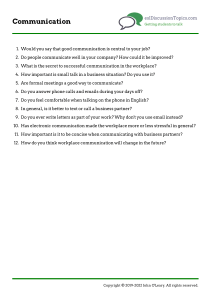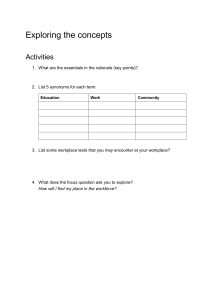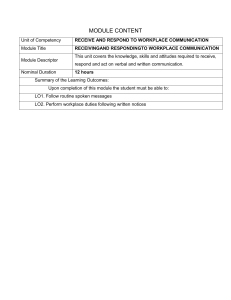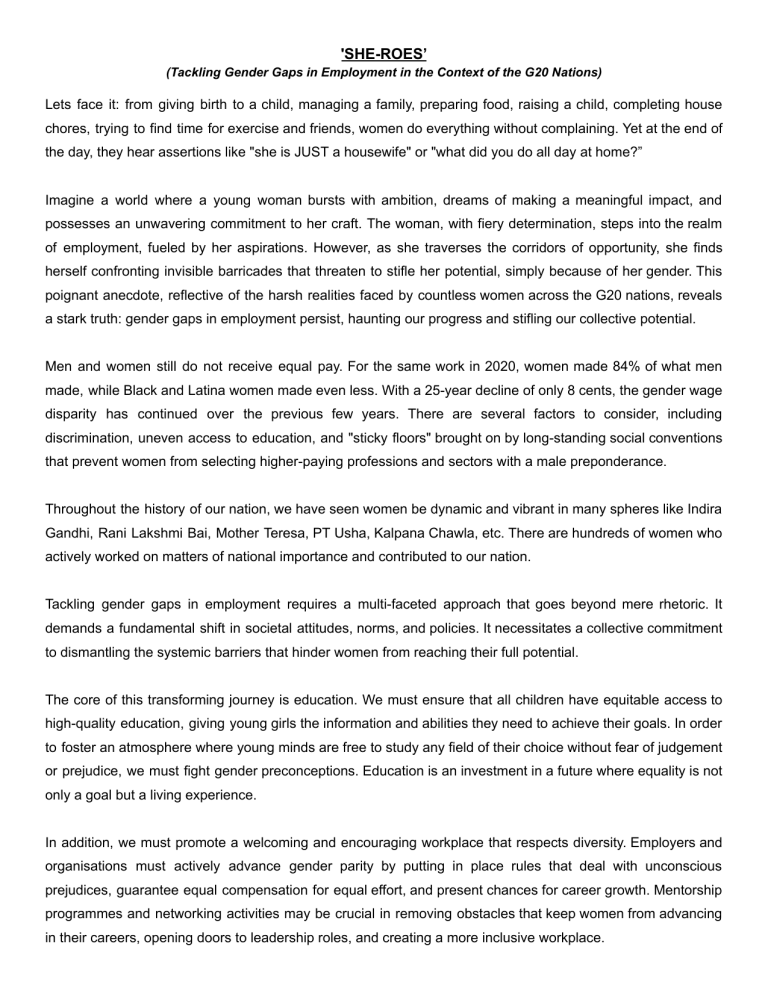
'SHE-ROES’ (Tackling Gender Gaps in Employment in the Context of the G20 Nations) Lets face it: from giving birth to a child, managing a family, preparing food, raising a child, completing house chores, trying to find time for exercise and friends, women do everything without complaining. Yet at the end of the day, they hear assertions like "she is JUST a housewife" or "what did you do all day at home?” Imagine a world where a young woman bursts with ambition, dreams of making a meaningful impact, and possesses an unwavering commitment to her craft. The woman, with fiery determination, steps into the realm of employment, fueled by her aspirations. However, as she traverses the corridors of opportunity, she finds herself confronting invisible barricades that threaten to stifle her potential, simply because of her gender. This poignant anecdote, reflective of the harsh realities faced by countless women across the G20 nations, reveals a stark truth: gender gaps in employment persist, haunting our progress and stifling our collective potential. Men and women still do not receive equal pay. For the same work in 2020, women made 84% of what men made, while Black and Latina women made even less. With a 25-year decline of only 8 cents, the gender wage disparity has continued over the previous few years. There are several factors to consider, including discrimination, uneven access to education, and "sticky floors" brought on by long-standing social conventions that prevent women from selecting higher-paying professions and sectors with a male preponderance. Throughout the history of our nation, we have seen women be dynamic and vibrant in many spheres like Indira Gandhi, Rani Lakshmi Bai, Mother Teresa, PT Usha, Kalpana Chawla, etc. There are hundreds of women who actively worked on matters of national importance and contributed to our nation. Tackling gender gaps in employment requires a multi-faceted approach that goes beyond mere rhetoric. It demands a fundamental shift in societal attitudes, norms, and policies. It necessitates a collective commitment to dismantling the systemic barriers that hinder women from reaching their full potential. The core of this transforming journey is education. We must ensure that all children have equitable access to high-quality education, giving young girls the information and abilities they need to achieve their goals. In order to foster an atmosphere where young minds are free to study any field of their choice without fear of judgement or prejudice, we must fight gender preconceptions. Education is an investment in a future where equality is not only a goal but a living experience. In addition, we must promote a welcoming and encouraging workplace that respects diversity. Employers and organisations must actively advance gender parity by putting in place rules that deal with unconscious prejudices, guarantee equal compensation for equal effort, and present chances for career growth. Mentorship programmes and networking activities may be crucial in removing obstacles that keep women from advancing in their careers, opening doors to leadership roles, and creating a more inclusive workplace. More women are now able to pursue higher education, and they outperform their male counterparts in most nations. We are surrounded by strong women who publicly oppose injustice and encourage other women to do the same. Global campaigns like #MeToo bring attention to a topic that was formerly forbidden. All of these indications provide cause for some confidence. However, waiting around for change or even just expressing a wish to improve things won't help us genuinely address gender imbalance in the workplace. If we want to attain gender parity, we have to stand up and do something. To conclude, we frequently hear biased statements like “Men are more assertive than women, that’s why they request and get a promotion more often.”; “After a certain age, women will struggle to balance family needs with the requirements of a senior position.” or “Women are more sensitive, thus not able to handle the pressure that goes with leadership.” But it is important to remember that there is a 'man' in every 'woman' and a 'he' in every 'she'. Giver her an equal opportunity, and you will see the benefit with your own eyes. Let's move ahead of stereotypical gender binaries. Look around, and there are a lot more than masculine and feminine. Let us now celebrate not just heroes but also she-roes! Arya Vachhani, Grade 12 Equanimity, Fountainhead School, Surat, Gujarat.
